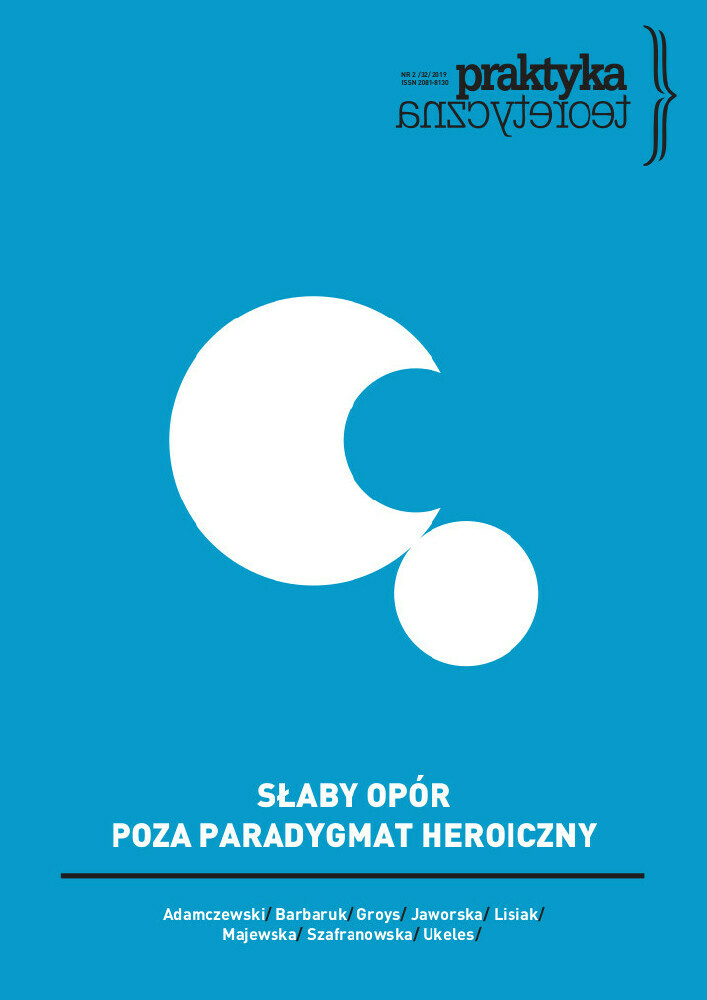Abstract
The article reviews some recent developments in ecocritical discourses. It briefly overviews the discipline from the point of view of weak thinking and comments on Timothy Morton‟s hyperobjects, a notion which results in what he calls “the state of weakness and lameness for human beings”. This position is contextualised within the claims of Object-Oriented Ontology to demonstrate how – using Nicholas Royle's notion of veering – such ecothinking, while drawing on literary discourses, uses a weakened, non-anthropocentric position to offer an alternative to the standard „strong‟ mode of thinking and writing about the environment, to take it beyond didacticism, guilt and threat.References
Barry, Peter. 2002. Beginning Theory: An Introduction to Literary and Cultural Theory. Manchester: Manchester University Press.
Bonneuil, Christophe and Jean-Baptiste Fressoz. 2016. The Shock of the Anthropocene: The Earth, Hostory and Us. Trans. David Fernbach. London: Verso.
Buell, Lawrence. 1995. The Environmental Imagination: Thoreau, Nature Writing, and the Formation of American Culture. Cambridge, London: Verso [e-text].
Buell, Lawrence. 2006. The Future of Environmental Criticism. Environmental Crisis and Literary Imagination. Malden–Oxford–Carlton: Blackwell Publishing.
Casarino, Cesare, and Antonio Negri. 2008. In Praise of the Common. A Conversation on Philosophy and Politics. Minneapolis–London: University of Minnesota Press.
Clark, Timothy. 2011. The Cambridge Introduction to Literature and the Environment. Cambridge: Cambridge University Press.
Cohen, Jeffrey Jerome, and Lowell Duckert (eds.). 2017. Veer Ecology – A Companion for Environmental Thinking. Minneapolis–London: University of Minnesota Press.
Colebrook, Claire. 2014. Death of the Posthuman. Essays on Extinction Vol.1. Michigan: Open Humanities Press.
Cuddon, J.A. 1999. The Penguin Dictionary of Literary Terms and Literary Theory. London: Penguin.
Deleuze, Gilles and Félix Guattari. 2004 [1972]. Anti-Oedipus: Capitalism and Schizophrenia. Trans. Robert Hurley, Mark Seem, and Helen R. Lane. London: Continuum.
Deleuze, Gilles and Félix Guattari. 2004 [1980]. A Thousand Plateaus: Capitalism and Schizophrenia. Trans. Brian Massumi. London: Continuum.
Estok, Simon. 2011. Ecocriticism and Shakespeare. Reading Ecophobia. New York: Palgrave Macmillan Garrard, Greg. 2004. Ecocriticism. London–New York: Routledge.
Glotfelty Cheryll, and Harold Fromm (eds.). 1996. The Ecocritical Reader. Landmarks in Literary Ecology. Athens–London: The University of Georgia Press Haraway, Donna J. 2016. Staying with the Trouble. Making Kin in the Chtulucene. Durham–London: Duke University Press.
Harman, Graham. 2002. Tool-Being: Heidegger and the Metaphysics of Objects. Chicago–La Salle: Open Court.
Harman, Graham. 2018. Object-Oriented Ontology. A New Theory of Everything. London: Penguin Random House.
Iovino, Serenella and Serpil Oppermann (eds.). 2014. Material Ecocriticism. Bloomington–Indianapolis: Indiana University Press.
Land, Nick. 2012. The Dark Enlightenment. Retrieved from http://www.thedarkenlightenment.com/the-dark-enlightenment-by-nick-land/ (accessed 08.06.2019).
Lentricchia, Frank, and Thomas McLaughlin (eds.). 1994. Critical terms for literary study. Chicago: University of Chicago Press.
Love, Glen A. 2003. Practical Ecocriticism: Literature, Biology and the Environment. Charlottesville: University of Virginia Press.
Macey, David. 2000. The Penguin Dictionary of Critical Theory. London: Penguin.
Moore, Jason W. 2018. “Anthropocene? More like »Capitalocene«. Interview by Gennaro Avallone and Emanuele Leonard.” In Il manifesto, Global Edition. Retrieved from https://global.ilmanifesto.it/anthropocene-more-like-capitalocene/ (accessed 08.06.2019).
Morton, Timothy. 2007. Ecology without Nature. Rethinking Environmental Aesthetics. Cambridge–London: Harvard University Press.
Morton, Timothy. 2010. Ecological Thought. Cambridge–London: Harvard University Press.
Morton, Timothy. 2013. Hyperobjects. Philosophy and Ecology after the End of the World. Minneapolis–London: University of Minnesota Press.
Morton, Timothy. 2016. Dark Ecology. For a Logic of Future Coexistence. New York: Columbia University Press.
Morton, Timothy. 2017. “Attune.” In Veer Ecology. A Companion for Environmental Thinking. Eds. Jeffrey J. Cohen and Lowell Duckert. Minneapolis–London: University of Minnesota Press.
Morton, Timothy. 2018. Being Ecological. Cambridge: The MIT Press. Nayar, Pramod K. 2010. Contemporary Literary and Cultural Theory: From Structuralism to Ecocriticism. Delhi: Longman/Dorling Kindersley.
Leitch, Vincent B. et al. (eds.). 2001. The Norton Anthology of Theory and Criticism. New York–London: W.W. Norton.
Royle, Nicholas. 2011. Veering. A Theory of Literature. Edinburgh: Edinburgh University Press.
Royle, Nicholas. 2017. “Afterword: On the Veer.” In Veer Ecology. A Companion for Environmental Thinking. Eds. Jeffrey J. Cohen and Lowell Duckert. Minneapolis–London: University of Minnesota Press.
Stoppard, Tom. 2013. Darkside. London: Faber and Faber.
Vattimo, Gianni. 1994. The Transparent Society. Trans. David Webb. Baltimore: John Hopkins University Press.
License
“Theoretical Practice” seeks to put into practice the idea of open access to knowledge and broadening the domain of the commons. It serves the development of science, thinking and critical reflection. The journal is published in open-access mode under the CC-BY-NC-SA 4.0 license (detail available here: http://creativecommons.org/licenses/by-nc-sa/4.0/). Articles published in the journal may be freely distributed, stored, printed and utilized for academic and teaching purposes without restrictions.
They should not be, however, used for any commercial purposes or be reconstructed into derivative creations. Access to the journal may not be limited or offered for a fee by any third party.
Prospective authors are obliged to fill in, sign and send back the publishing contract compliant with the CC licencing. [PL.pdf, PL.doc, EN.pdf,EN.doc].
According to this contract, authors grant the journal a non-exclusive right to publish their work under the creative commons license (CC-BY-NC-SA 4.0) without any financial obligation on both sides of the contract.
Before submission authors should make sure that derivative materials they use are not protected by copyright preventing their non-commercial publication. Authors are responsible for any respective copyright violations.
